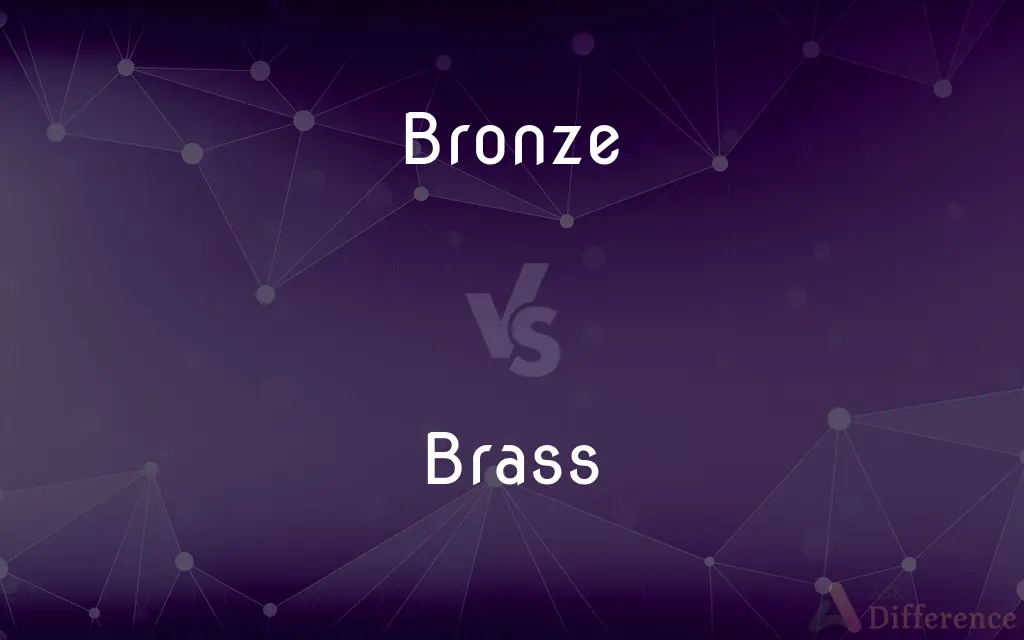Bronze vs. Brass — What's the Difference?
Edited by Tayyaba Rehman — By Fiza Rafique — Updated on March 20, 2024
Bronze is an alloy primarily made of copper and tin, known for its strength and corrosion resistance, while Brass is an alloy of copper and zinc, prized for its malleability and acoustic properties.

Difference Between Bronze and Brass
Table of Contents
ADVERTISEMENT
Key Differences
Bronze, an ancient alloy dating back to the Bronze Age, is renowned for its durability and resistance to corrosion, making it ideal for maritime applications and sculptures. Brass, on the other hand, is favored for its malleability and acoustic properties, making it the preferred choice for musical instruments, decorative items, and plumbing fixtures.
The composition of Bronze, mainly copper and tin, gives it a darker, more subdued color, often with a slight greenish tint over time due to patination. Brass, with its copper and zinc composition, typically exhibits a brighter, yellowish hue, closely resembling gold, which enhances its appeal for decorative use.
In terms of mechanical properties, Bronze stands out for its toughness and resistance to wear, which is why it's commonly used in bearings, bushings, and gears. Brass, while also strong, is more notable for its ability to be easily worked into complex shapes, thanks to its excellent machinability.
When it comes to acoustic performance, Brass is superior due to its ability to produce a wide range of tones, from soft and mellow to bright and piercing. This quality makes it a staple in the manufacture of musical instruments like trumpets and saxophones. Bronze, while also used in musical instruments, such as cymbals and bells, offers a richer, more resonant sound due to its denser composition.
Comparison Chart
Primary Composition
Copper and tin
Copper and zinc
ADVERTISEMENT
Color
Darker, brownish with potential for green patina
Bright, yellowish, gold-like
Mechanical Properties
High strength, wear resistance
Malleability, good machinability
Uses
Maritime components, sculptures, bearings
Musical instruments, decorative items, plumbing
Acoustic Properties
Rich, resonant sound for bells and cymbals
Wide tonal range, preferred for brass instruments
Compare with Definitions
Bronze
Heavier and harder compared to brass, making it suitable for heavy-duty components.
The machinery's gears were made of bronze for their toughness.
Brass
Exhibits a bright, gold-like appearance, making it popular for decorative uses.
The brass fittings added an elegant touch to the luxury yacht's interior.
Bronze
Often used in applications requiring durability and resistance to elements.
Bronze fittings are preferred for their longevity in marine environments.
Brass
An alloy primarily of copper and zinc, known for its malleability.
The artisan crafted intricate decorative pieces from brass.
Bronze
Chosen for musical instruments that require deep, rich tones.
The orchestra's cymbals were made of bronze for their superior sound quality.
Brass
Requires regular polishing to maintain its shine and prevent tarnish.
The brass candlesticks were polished regularly to keep their gleam.
Bronze
An alloy of copper and tin with notable strength and corrosion resistance.
The ancient statue was cast in bronze for its enduring beauty.
Brass
Frequently used in musical instruments for its excellent acoustic properties.
Brass trumpets are favored for their bright, penetrating sound.
Bronze
Develops a patina over time, adding to its aesthetic appeal.
The bronze sculpture's green patina added to its historical significance.
Brass
Easier to machine and form into complex shapes than bronze.
The complex plumbing fixtures were made from brass for ease of manufacturing.
Bronze
Bronze is an alloy consisting primarily of copper, commonly with about 12–12.5% tin and often with the addition of other metals (such as aluminium, manganese, nickel or zinc) and sometimes non-metals or metalloids such as arsenic, phosphorus or silicon. These additions produce a range of alloys that may be harder than copper alone, or have other useful properties, such as strength, ductility, or machinability.
Brass
Brass is an alloy of copper and zinc, in proportions which can be varied to achieve varying mechanical, electrical, and chemical properties. It is a substitutional alloy: atoms of the two constituents may replace each other within the same crystal structure.
Bronze
A yellowish-brown alloy of copper with up to one-third tin
The Minoans made large numbers of statuettes in ivory and bronze
A bronze statue
Brass
A yellowish alloy of copper and zinc, sometimes including small amounts of other metals, but usually 67 percent copper and 33 percent zinc.
Bronze
Make (a person or part of the body) suntanned
Alison was bronzed by outdoor life
Brass
Ornaments, objects, or utensils made of this alloy.
Bronze
Give (something) a surface of bronze or something resembling bronze
The doors were bronzed with sculpted reliefs
Brass
The section of a band or an orchestra composed of brass instruments.
Bronze
Any of various alloys of copper and tin in various proportions, sometimes with traces of other metals.
Brass
Brass instruments or their players considered as a group.
Bronze
Any of various alloys of copper, with or without tin, and antimony, phosphorus, or other components.
Brass
A memorial plaque or tablet made of brass, especially one on which an effigy is incised.
Bronze
A work of art made of one of these alloys.
Brass
A bushing or similar lining for a bearing, made from a copper alloy.
Bronze
A medal made of bronze awarded to one placing third in a competition, as in the Olympics.
Brass
(Informal) Bold self-assurance; effrontery.
Bronze
A moderate yellowish to olive brown.
Brass
(Slang) High-ranking military officers or other high officials.
Bronze
A pigment of this color.
Brass
Chiefly British Money.
Bronze
Made of or consisting of bronze.
Brass
(uncountable) A metallic alloy of copper and zinc used in many industrial and plumbing applications.
Bronze
Of a moderate yellowish to olive brown.
Brass
A memorial or sepulchral tablet usually made of brass or latten
Bronze
To give the color or appearance of bronze to.
Brass
Fittings, utensils, or other items made of brass
Bronze
To make (a person or a person's skin) darker by exposure to the sun; tan.
Brass
(music) A class of wind instruments, usually made of metal (such as brass), that use vibrations of the player's lips to produce sound; the section of an orchestra that features such instruments
Bronze
To make (a person or a person's skin) darker by the application of bronzer.
Brass
Spent shell casings (usually made of brass); the part of the cartridge left over after bullets have been fired.
Bronze
To become bronze in color, especially by exposure to the sun or the application of bronzer
"He wondered what she thought of all these white bodies bronzing in the heat" (Robert Ferrigno).
Brass
(uncountable) The colour of brass.
Bronze
(uncountable) A naturally occurring or man-made alloy of copper, usually in combination with tin, but also with one or more other metals.
Brass
High-ranking officers.
The brass are not going to like this.
The brass is not going to like this.
Bronze
A reddish-brown colour, the colour of bronze.
Brass
A brave or foolhardy attitude; impudence.
You've got a lot of brass telling me to do that!
Bronze
(countable) A work of art made of bronze, especially a sculpture.
Brass
Money.
Bronze
A bronze medal.
She wanted to win the tournament, but had to settle for the bronze after being beaten in the semi-finals.
Brass
Inferior composition.
Bronze
Boldness; impudence.
Brass
A brass nail; a prostitute.
Bronze
Made of bronze metal.
Brass
Made of brass, of or pertaining to brass.
Bronze
Having a reddish-brown colour.
Brass
Of the colour of brass.
Bronze
(of the skin) Tanned; darkened as a result of exposure to the sun.
Brass
(informal) Impertinent, bold: brazen.
Bronze
(transitive) To plate with bronze.
My mother bronzed my first pair of baby shoes.
Brass
(slang) Bad, annoying; as wordplay applied especially to brass instruments.
Bronze
(transitive) To color bronze; (of the sun) to tan.
Brass
Of inferior composition.
Bronze
To change to a bronze or tan colour due to exposure to the sun.
Brass
(slang) Brass monkey; cold.
Bronze
(transitive) To make hard or unfeeling; to brazen.
Brass
(transitive) To coat with brass.
Bronze
An alloy of copper and tin, to which small proportions of other metals, especially zinc, are sometimes added. It is hard and sonorous, and is used for statues, bells, cannon, etc., the proportions of the ingredients being varied to suit the particular purposes. The varieties containing the higher proportions of tin are brittle, as in bell metal and speculum metal.
Brass
An alloy (usually yellow) of copper and zinc, in variable proportion, but often containing two parts of copper to one part of zinc. It sometimes contains tin, and rarely other metals.
Bronze
A statue, bust, etc., cast in bronze.
A print, a bronze, a flower, a root.
Brass
A journal bearing, so called because frequently made of brass. A brass is often lined with a softer metal, when the latter is generally called a white metal lining. See Axle box, Journal Box, and Bearing.
Bronze
A yellowish or reddish brown, the color of bronze; also, a pigment or powder for imitating bronze.
Brass
Coin made of copper, brass, or bronze.
Provide neither gold, nor silver, nor brass in your purses, nor scrip for your journey.
Bronze
Boldness; impudence; "brass."
Imbrowned with native bronze, lo! Henley stands.
Brass
Impudence; a brazen face.
Bronze
To give an appearance of bronze to, by a coating of bronze powder, or by other means; to make of the color of bronze; as, to bronze plaster casts; to bronze coins or medals.
The tall bronzed black-eyed stranger.
Brass
Utensils, ornaments, or other articles of brass.
The very scullion who cleans the brasses.
Bronze
To make hard or unfeeling; to brazen.
The lawer who bronzes his bosom instead of his forehead.
Brass
Lumps of pyrites or sulphuret of iron, the color of which is near to that of brass.
Bronze
An alloy of copper and tin and sometimes other elements; also any copper-base alloy containing other elements in place of tin
Brass
An alloy of copper and zinc
Bronze
A sculpture made of bronze
Brass
A wind instrument that consists of a brass tube (usually of variable length) blown by means of a cup-shaped or funnel-shaped mouthpiece
Bronze
Give the color and appearance of bronze to something;
Bronze baby shoes
Brass
The persons (or committees or departments etc.) who make up a body for the purpose of administering something;
He claims that the present administration is corrupt
The governance of an association is responsible to its members
He quickly became recognized as a member of the establishment
Bronze
Get a tan, from wind or sun
Brass
Impudent aggressiveness;
I couldn't believe her boldness
He had the effrontery to question my honesty
Bronze
Of the color of bronze
Brass
An ornament or utensil made of brass
Bronze
Made from or consisting of bronze
Brass
The section of a band or orchestra that plays brass instruments
Brass
A memorial made of brass
Common Curiosities
What is the main difference between bronze and brass?
The main difference lies in their composition: bronze is made of copper and tin, while brass is made of copper and zinc.
Can bronze and brass be used interchangeably?
Due to differences in properties and appearance, they are not typically interchangeable and are chosen based on specific needs.
Are bronze and brass magnetic?
Both alloys are generally non-magnetic, though certain types of brass with high iron content may show magnetic properties.
Which alloy is better for outdoor sculptures?
Bronze is often preferred for outdoor sculptures due to its superior corrosion resistance and patina formation.
Which is more corrosion-resistant, bronze or brass?
Bronze is generally more corrosion-resistant, especially in marine environments.
Can brass be used in marine applications?
Brass can be used in marine applications but is less resistant to corrosion than bronze, especially in saltwater environments.
Why are brass instruments not made of bronze?
Brass offers a wider range of tonal qualities suitable for the bright and versatile sounds desired in brass instruments.
Is it easy to tell bronze and brass apart?
Yes, by color: bronze has a darker, more subdued hue, while brass is brighter and more yellowish.
Which alloy is heavier, bronze or brass?
Bronze is generally heavier due to its higher tin content.
Do both alloys tarnish over time?
Yes, but brass tends to tarnish more quickly and requires regular polishing to maintain its appearance.
Share Your Discovery

Previous Comparison
Advil vs. Motrin
Next Comparison
Catastrophe vs. MiracleAuthor Spotlight
Written by
Fiza RafiqueFiza Rafique is a skilled content writer at AskDifference.com, where she meticulously refines and enhances written pieces. Drawing from her vast editorial expertise, Fiza ensures clarity, accuracy, and precision in every article. Passionate about language, she continually seeks to elevate the quality of content for readers worldwide.
Edited by
Tayyaba RehmanTayyaba Rehman is a distinguished writer, currently serving as a primary contributor to askdifference.com. As a researcher in semantics and etymology, Tayyaba's passion for the complexity of languages and their distinctions has found a perfect home on the platform. Tayyaba delves into the intricacies of language, distinguishing between commonly confused words and phrases, thereby providing clarity for readers worldwide.















































